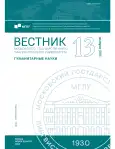Verbalisation of the Frame Structure of the AIDS Concept in French Fiction
- Authors: Maslova L.O.1
-
Affiliations:
- Moscow State Linguistic University
- Issue: No 13(894) (2024)
- Pages: 98-104
- Section: Linguistics
- URL: https://journal-vniispk.ru/2542-2197/article/view/291536
- ID: 291536
Cite item
Abstract
The article examines the concept of AIDS in fiction through the prism of frame analysis. The aim of the study is to reveal how the perception of AIDS and its social and cultural aspects are formed in the work of fiction "To the Friend Who Didn’t Save My Life" by Hervé Guibert. The main method of the research is frame analysis, which allows to examine how literary images and expressive means structure the perception of the disease. Frames of illness, death, social stigma and betrayal are analyzed. The results of the study show that literary works play an important role in shaping public opinion about AIDS, contributing to the reduction of social stigma and prejudice against people affected by AIDS.
About the authors
Larisa Olegovna Maslova
Moscow State Linguistic University
Author for correspondence.
Email: larissa_maslova@yahoo.com
Postgraduate student, Lecturer at the Department of Lexicology and Stylistics of French French Language Faculty, Moscow State Linguistic University
Russian FederationReferences
- Kuznetsov, V. G. (2007). Predmet i zadachi diahronicheskoj sopostavitelnoj kontсeptologii = Subject and tasks of diachronic comparative conceptology. Voprosy kognitivnoj lingvistiki. (In Russ.)
- Goffman, E. (1974). Frame Analysis: An Essay on the Organization of Experience. Boston: Northeastern University Press.
- Fillmore, C. J. (1982). Frame Semantics. In Linguistic Society of America. The Linguistic Society of America Summer Institute. Chicago: University of Chicago Press.
- Lakoff, G., & Johnson, M. (1980). Metaphors We Live By. Chicago: University of Chicago Press.
Supplementary files










